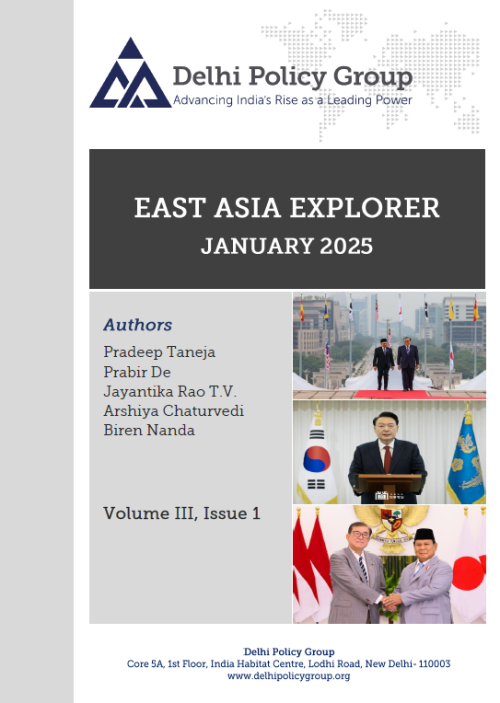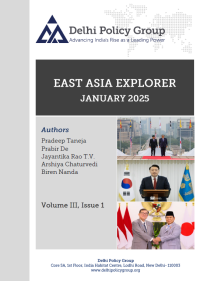East Asia Explorer
Date: February 06, 2025
The East Asia Explorer tracks evolving geopolitical trends, emerging security challenges, and progress towards regional integration in East Asia. It focuses on the ASEAN grouping, domestic and foreign policy developments in countries of East Asia and Oceania, great power contestation in the region, and India’s relations with ASEAN and its member countries.
In this issue, Dr. Pradeep Taneja provides an analysis of Australian perspectives regarding Chinese diplomatic moves in the Indo-Pacific region. He underscores that, while Australia is attempting to stabilise its bilateral relations with China, the Australians are influenced by a complex interplay of economic interests, security concerns, and the broader dynamics of both regional and global security.
Prof. Prabir De explores Myanmar's ongoing political instability and conflicts and their impact on regional geopolitical connectivity projects. He emphasises that the instability is significantly impeding the progress of ASEAN-India relations, as physical connectivity projects are either advancing slowly or have come to a standstill. Achieving peace and democracy in Myanmar is essential for realising these connectivity projects, not only for the relationship between ASEAN and India but also for linking Southeast Asia with India, West Asia, and Europe.
Jayantika Rao reviews Japanese Prime Minister Shigeru Ishiba’s first bilateral visit abroad since assuming office last October, to Malaysia and Indonesia. In the light of potential changes in US foreign policy under President Trump, Japan is strengthening its commitment to Southeast Asia by enhancing its economic and defence cooperation with ASEAN countries.
Arshiya Chaturvedi examines the impact of the South Korean political crisis, specifically the imposition of martial law by President Yoon Suk Yeol on December 3, 2024, on US-ROK relations. She finds that,within a broader context, the longstanding partnership and shared interests between the two allies are unlikely to face any substantial disruptions. Nevertheless, the political instability currently affecting South Korea, coupled with the leadership transition in the US, may give rise to certain areas of contention.
Amb. Biren Nanda examines India’s ‘Act East Policy’ and its implications for national security. He posits that this policy serves as a strategic response to the significant security challenges presented by both China and Pakistan, and aims to enhance India’s role within Asia by reinforcing regional security and fostering economic ties, particularly through increased cooperation with neighbouring nations.
To read this East Asia Explorer, Vol. III, Issue 1, please see the PDF attached.
In this issue, Dr. Pradeep Taneja provides an analysis of Australian perspectives regarding Chinese diplomatic moves in the Indo-Pacific region. He underscores that, while Australia is attempting to stabilise its bilateral relations with China, the Australians are influenced by a complex interplay of economic interests, security concerns, and the broader dynamics of both regional and global security.
Prof. Prabir De explores Myanmar's ongoing political instability and conflicts and their impact on regional geopolitical connectivity projects. He emphasises that the instability is significantly impeding the progress of ASEAN-India relations, as physical connectivity projects are either advancing slowly or have come to a standstill. Achieving peace and democracy in Myanmar is essential for realising these connectivity projects, not only for the relationship between ASEAN and India but also for linking Southeast Asia with India, West Asia, and Europe.
Jayantika Rao reviews Japanese Prime Minister Shigeru Ishiba’s first bilateral visit abroad since assuming office last October, to Malaysia and Indonesia. In the light of potential changes in US foreign policy under President Trump, Japan is strengthening its commitment to Southeast Asia by enhancing its economic and defence cooperation with ASEAN countries.
Arshiya Chaturvedi examines the impact of the South Korean political crisis, specifically the imposition of martial law by President Yoon Suk Yeol on December 3, 2024, on US-ROK relations. She finds that,within a broader context, the longstanding partnership and shared interests between the two allies are unlikely to face any substantial disruptions. Nevertheless, the political instability currently affecting South Korea, coupled with the leadership transition in the US, may give rise to certain areas of contention.
Amb. Biren Nanda examines India’s ‘Act East Policy’ and its implications for national security. He posits that this policy serves as a strategic response to the significant security challenges presented by both China and Pakistan, and aims to enhance India’s role within Asia by reinforcing regional security and fostering economic ties, particularly through increased cooperation with neighbouring nations.
To read this East Asia Explorer, Vol. III, Issue 1, please see the PDF attached.



